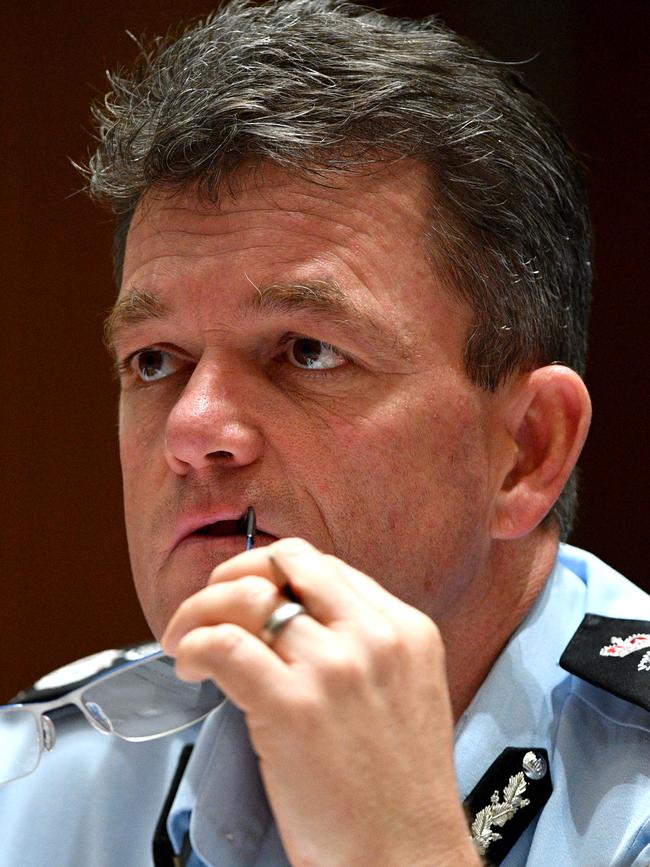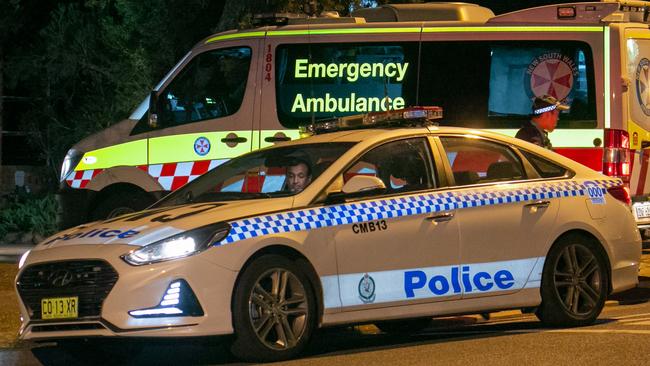AFP admits mental health toll on frontline officers ‘confronting’
A shocking proportion of Australian Federal Police officers are facing psychological distress as a result of their jobs, with the commissioner admitting that, while staff wellbeing is a priority, “we have not always understood what this has meant”.
Behind the Scenes
Don't miss out on the headlines from Behind the Scenes. Followed categories will be added to My News.
Almost one in four Australian Federal Police members are suffering some form of psychological distress from the rigours of the job, prompting the force to look at “building a fence at the top of the cliff”.
In a heartfelt address to a parliamentary inquiry looking at mental health in first responders, AFP Commissioner Andrew Colvin said the stories of despair in the ranks were “confronting”.

He said for the past two years the AFP had consulted external mental health agencies and experts, including from industry leader the not-for-profit Phoenix Australia — Centre for Posttraumatic Mental Health.
Their study, now tabled as part of the AFP’s submission to the Senate inquiry which is to report next month, found almost a quarter of respondents questioned in writing and in focus groups were experiencing moderate to high levels of psychological distress.
Specifically, 14 per cent reported symptoms consistent with depression, 9 per cent of PTSD, 6 per cent clinically significant anxiety and 9 per cent alcohol problems. The report noted the rates were based on staff who elected to be part of the study and were not necessarily representative of rates across the AFP workforce, although 45 per cent of the force’s 6500-strong workforce took part.
True Crime Australia: Body cam footage exposes juvenile justice crisis
Detective work: One cop’s quest to catch serial paedophile
The mental health injury analysis was on par with a similar study conducted in the ranks of the Australian Defence Force.
Mr Colvin told the inquiry he had thought a lot and grappled with what to tell the committee about the issue, particularly given late last month an officer committed suicide in the AFP headquarters in Canberra, the third officer who had taken their own life inside an AFP station in less than two years.
“I cannot begin to tell you the impact this has had on my workforce,” he said. “It brings into stark relief the issue of mental health and the need for us to consider what more can be done to safeguard the wellbeing of police and other first responders.”
He said policing was at the highest risk of mental injury, with the “privileged role in society coming at a cost”.

He said all recommendations made by consultants had been adopted, including looking at culture, but there was still a lot of work to do. He cited a “survivor” of mental health challenges who told police commissioners they “need to invest in building a fence at the top of the cliff not just focus on the ambulance at the bottom of the cliff”.
“It is a confronting thought but so incredibly true,” Mr Colvin told the Senate Standing Committee.
He also conceded the AFP had failed to move quickly enough on the emerging issue.
“I know that I speak on behalf of former AFP commissioners as well when I say that the health and wellbeing of our members has always been at the forefront of our minds but we have not always understood what this has meant,” he said.
He applauded services and initiatives offered to military veterans but called on the Commonwealth to extend those to emergency first responders, both serving and retired, including from police, firefighters and paramedics.

The AFP union said unlike soldiers being deployed in and out of theatre, police were constantly on the frontline and members disclosing a mental health condition faced career limits, not least of all by losing their “secret” security clearance level access, potential loss of the use of force powers and significant pay loss.
They said since Phoenix published its review in January and the Australian National Audit Office (ANAO) published their snapshot in March, not nearly enough had been done to deliver on their recommendations.
“The Phoenix Australia report specifically recommended the engagement of psychologists at the rate of one per 250 staff, or about 25 given current AFP staffing levels. At present, the AFP employs fewer than ten,” the AFP Association said in its submission.
The Senate inquiry launched in March is tasked with specifically looking at what roles the Commonwealth and state governments play in addressing the high rates of mental health issues suffered by first responders, emergency workers and volunteers.
It has received more than 100 submissions from police services and individuals across Australia and is due to report next month.
Lifeline Australia offers crisis support and suicide prevention services. Call 13 11 14 or visit lifeline.org.au
Originally published as AFP admits mental health toll on frontline officers ‘confronting’


